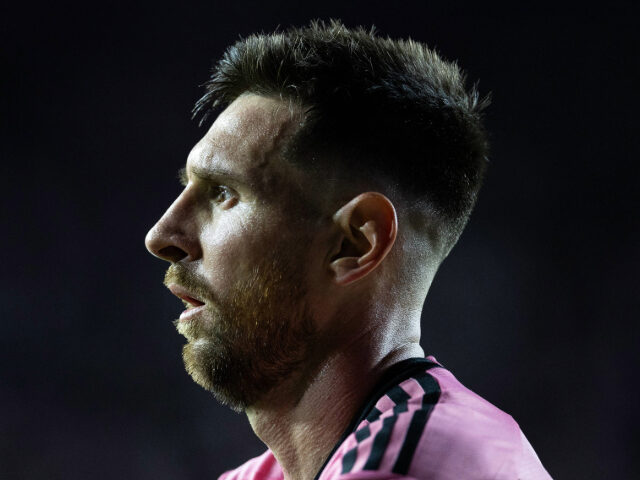Soccer superstar Lionel Messi published a groveling video on the Chinese regime-controlled social media app Weibo on Tuesday in which he insisted he had no “political” objections to China and enjoyed a “close and lovely” relationship with the Chinese people — his latest attempt to quell fallout from his inability to play during an exhibition game in Hong Kong.
Messi traveled to Hong Kong with his league team, Inter Miami, in early February as part of a tour of Asia that included stops in Saudi Arabia and Japan. His appearance in Hong Kong prompted a frenzy among soccer fans, who paid exorbitant prices for tickets to the game only to find that Messi was not playing. Luis Suárez, another prominent Inter Miami player with a large fanbase, also skipped the game. Both Messi and Suárez reportedly missed playing in the game due to injuries.
On February 7, Messi played in a similar friendly match in Tokyo, Japan, arousing the ire of the Chinese government. The state-run Global Times newspaper claimed that Messi appeared “expressionless and hands-in-pocket” in Hong Kong, compared to a more friendly disposition in Japan, and speculated that the athlete had “political motives” for his attitude.
The government of Hong Kong, fully coopted by the Chinese Communist Party following the crushing of pro-democracy protests in 2020, declared itself “extremely disappointed” by Messi’s absence and threatened “follow-up actions with the organizer.” According to the Global Times, Hong Kong police have received “at least six reports regarding Messi,” and the city’s consumer council documented 547 complaints regarding the game.
Soccer federations in Beijing and Hangzhou dropped plans to welcome the Argentine national team for exhibition matches scheduled for March, the latter explaining the cancelation was a result of “well-known issues.”
Shortly after the initial incident, Messi explained that doctors did not believe it would be safe for him to play in Hong Kong. In his video posted to Weibo on Tuesday — mocked online for resembling a “hostage video” — he reiterated his insistence that he had medical reasons not to play, explicitly denied that he had any “political” objections to the Chinese Communist Party, and described his relationship with Chinese fans as “lovely.”
“I’ve read and heard a lot of things said after what happened at the Hong Kong game. I wanted to make this video and give you the true version so no one has to continue reading false stories,” Messi said in Spanish, subtitled with Chinese and English text.
“I want to be in all of the matches, and I’ve heard that I didn’t want to play because of political issues and lots of other things that have nothing to do [with the absence],” Messi asserted, adding that “if it were so, I wouldn’t have even traveled to Japan” — suggesting some political objections to the Japanese government — “or gone to China so many times.”
Messi enjoyed a host of Chinese company sponsorships and regularly visited the country prior to the Hong Kong incident. His most recent trip before February occurred in June when he played a match on genocidal dictator Xi Jinping’s birthday. Messi also appeared on a livestream for the regime-linked e-commerce giant Alibaba, attempting to speak Mandarin.
“Since I began my career, I have had a very close and lovely relationship with China and done many things with China: interviews, games, events, and many matches with Barcelona with the [Argentine national] team,” Messi continued. “I did what I could. I was at the football clinic with all the children who were there; the truth is I couldn’t play.”
“I hope we see each other again soon, a big hug, ciao!” he concluded.
In his first remarks on the incident, shortly after the match, Messi attributed his absence from the game to “bad luck” and offered a detailed timeline of events regarding his injury.
“In the first match on the tour in [Saudi] Arabia, I felt discomfort in my adductor [leg muscle]; that’s why I exited,” Messi told reporters:
In the second match, I played the minutes I played to test myself … Then we went to Hong Kong and had the open-door training, and I went out because of the number of people we had and because there was also a clinic with the kids to do, and I wanted to be present and participate.
“Unfortunately, soccer things. In any match, someone can be injured. It happened to me,” he shrugged.
Messi did not explicitly apologize for not playing in the Hong Kong game in his Weibo video on Tuesday, a point former Global Times Editor-in-Chief Hu Xijin harped on in his response to the video.
“Messi did not apologize, but he has clearly explained what happened and ruled out political reasons,” Hu replied. “I just represent myself, and I accept his explanation. … Of course, after the controversy, Messi’s public image in China has been damaged, and it won’t easily be fixed. That’s the cost.”
China Daily, another state-run newspaper, flatly declared Messi’s video “not enough,” demanding — citing “experts” — “more transparent communication” in the future.
“There were much better options to avoid such a crisis. First, he needed to have made a faster response instead of posting the video two weeks later,” consulting expert Adam Zhang Qing told the outlet.

COMMENTS
Please let us know if you're having issues with commenting.